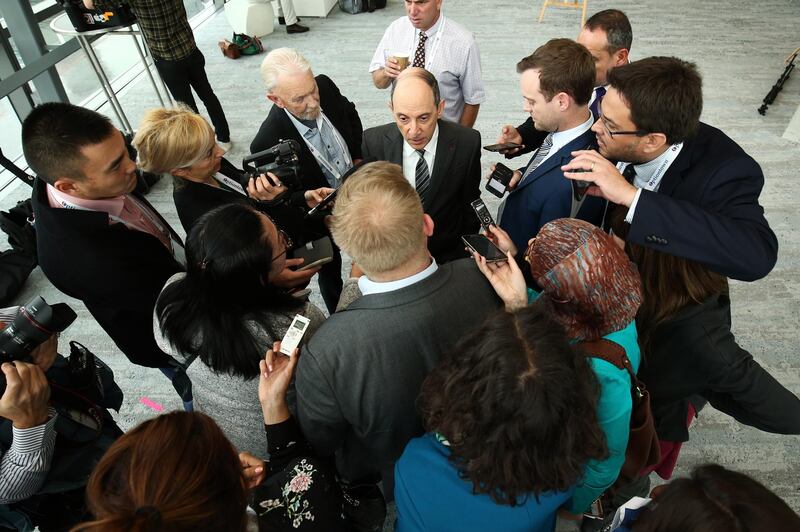The overcast clouds on rainy Sydney cast a long shadow over a gathering of airline executives this week.
At the IATA annual meeting they fretted over rising fuel prices, debated yields, compared fuel hedging, shook their heads at protectionist policies and made promises to address aviation’s gender inequality. Then it ended in controversy.
Qatar Airways’ chief executive officer, who said his job was too challenging for a woman, offered “heartfelt apologies” for his remarks and reiterated his record of appointing women to key positions.
The apology came a day after Akbar Al Baker, the new chairman of IATA’s board of governors, caused a firestorm on Tuesday when he said his airline had to be run by a man because of the challenges the job posed. Later, at a CEO summit organized by CAPA Centre for Aviation, Mr Al Baker backtracked and said it was a joke.
Few were amused at a press conference on Tuesday. The comment came in response to a reporter’s question about what concrete steps IATA would take to address the lack of women in aviation, especially in the Middle East.
Mr Al Baker's remarks were met with raised eyebrows, gasps and disbelief among a gathering of international media, and contrasted with responses by other airline chiefs on efforts to increase female participation in top jobs.
Alan Joyce, chief executive of Qantas, said 40 per cent of the airline’s senior management is female, including the head of international business, noting that an airline not tapping female talent will be “disadvantaged.”
Mr Al Baker later said that more than 33 per cent of his airline staff is female, 60 per cent of scholarship funds go to training women pilots and that he’d be happy to have a female CEO replace him.
__________
Read more:
[ Qatar Airways may incur loss for two consecutive years ]
[ Iata asks governments to release $5bn in airline revenues ]
[ E-commerce to drive air cargo growth in 2018 amid trade war threats ]
__________
The board of governors of IATA, which represents 290 airlines and 82 per cent of global air traffic, posed for a photo the day before its meeting: In a telling snapshot, the sole female boss of UK-based Flybe Christine Ourmieres-Widener, stood among 26 airline chiefs.
The picture highlighted a recurring theme during the male-dominated IATA meeting where panels comprised of men discussed ways to promote more women to senior positions.
Throughout the event, a mood of concern dominated discussions. Rising fuel costs threaten to squeeze thin profit margins as oil prices rise faster than ticket prices.
Global airline profits will be slashed 12 per cent this year as average oil prices reach $60 a barrel, IATA said in its forecast report.
Ballooning costs as fuel prices increase means some airlines will fold, Emirates president Tim Clark said at a panel.
“There will be some causalities,” he said.
Mr Clark said the unusual combination of higher fuel prices and the strengthening of the dollar, which typically move in opposite directions, will be a “double whammy” to the airline’s yields.
Emirates, known for its luxury cabins and onboard lounge, is responding to the needs of price-sensitive customers by offering a premium economy class to stem the “leakage” of passengers who can’t afford business class but want more legroom to rival airlines.
Airline executives said they’re locking in fuel hedges and investing in fuel-efficient aircraft to replace older models in their fleet to contain costs.
Passenger yields, a measure for airfares, will rise by 3.2 per cent this year, the first annual gains since 2011, as airlines look to make up for rising costs.
A higher oil price “is the new normal,” American Airlines CEO Doug Parker said. “You would see over time less capacity growth in the industry and therefore higher prices, but I don’t think that’s going to happen in the near-term.”
The “political forces pushing a protectionist agenda”, uncertainty following US withdrawal from Iran nuclear deal, unclear impact of Brexit and trade talks will add to the risks facing the industry, IATA director-general Alexandre de Juniac said.
Adding to airline concerns is increasing airport costs as more countries seek to privatize their hubs. Add to that the lack of capacity in airports and congested airspace that is too crowded to cope with the rising number of global passengers and airlines will have their hands full this year.
Airport traffic control protests in Europe are a bigger threat to its airlines that rising fuel prices, Willie Walsh, head of British Airways-parent IAG said.
The Iata gathering coincided with the anniversary of the boycott against Qatar by four Arab countries, which along with oil price hikes may drive its flag carrier into the red for a second consecutive year.
The challenges will keep the industry busy until the next IATA meeting scheduled in Seoul, Korea, in 2019.







